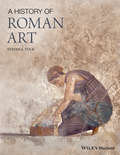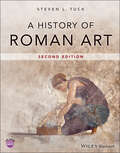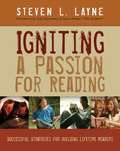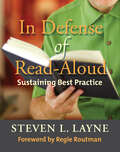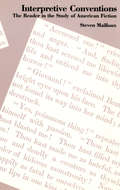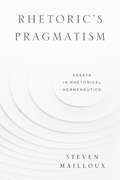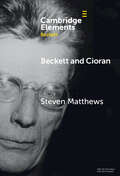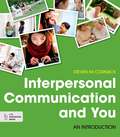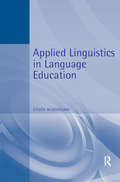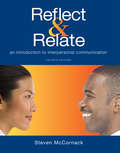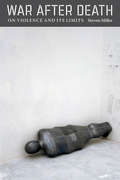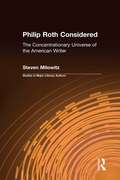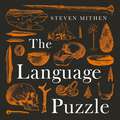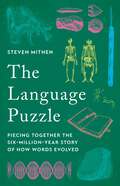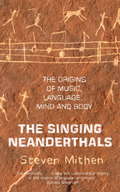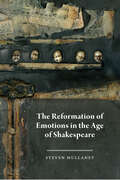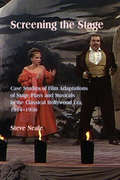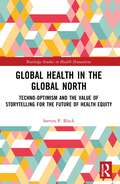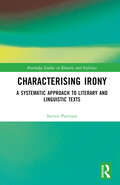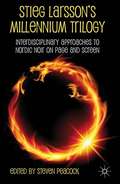- Table View
- List View
A History of Roman Art
by Steven L. TuckA History of Roman Art provides a wide-ranging survey of the subject from the founding of Rome to the rule of Rome's first Christian emperor, Constantine. Incorporating the most up-to-date information available on the topic, this new textbook explores the creation, use, and meaning of art in the Roman world. Extensively illustrated with 375 color photographs and line drawings Broadly defines Roman art to include the various cultures that contributed to the Roman system Focuses throughout on the overarching themes of Rome's cultural inclusiveness and art's important role in promoting Roman values Discusses a wide range of Roman painting, mosaic, sculpture, and decorative arts, as well as architecture and associated sculptures within the cultural contexts they were created and developed Offers helpful and instructive pedagogical features for students, such as timelines; key terms defined in margins; a glossary; sidebars with key lessons and explanatory material on artistic technique, stories, and ancient authors; textboxes on art and literature, art from the provinces, and important scholarly perspectives; and primary sources in translation A book companion website is available at www.wiley.com/go/romanart with the following resources: PowerPoint slides, glossary, and timeline Steven Tuck is the 2014 recipient of the American Archaeological Association's Excellence in Undergraduate Teaching Award.
A History of Roman Art
by Steven L. TuckThe new edition of the leading textbook on Roman art, updated with new images and expanded geographic and cultural scope A History of Roman Art is an expansive survey of the painting, mosaic, sculpture, decorative arts, and architecture of ancient Rome. This acclaimed textbook provides a fully-illustrated narrative history of Roman art that spans a millennium, from the early origins of Rome to the era of Emperor Constantine. Interwoven throughout the text are themes of Rome's cultural inclusiveness and the importance of art in promoting Roman values, helping students understand how diverse cultures contributed to Roman life. Accessible, chronologically-organized chapters provide numerous examples of the arts, their cultural and historical context, descriptions of artistic techniques, and writings by ancient authors—enabling students to develop a rich appreciation of art’s importance in the Roman world. Now in its second edition, this market-leading textbook features thoroughly revised content throughout. Additional images and excerpts from literary sources are complemented by new historical discussions of metalwork, carved gems, glass, and sarcophagi. This edition features more maps and illustrations, in-depth analysis of iconography, greater emphasis on the types of objects used to decorate the lives of ordinary Romans, expanded coverage of freedmen and women as artists, subjects, and patrons, and much more. A number of works that represent popular art have been added. That is, art in the everyday Roman world, rather than just the large scale works of sculpture and architecture of elite patrons. It also reveals patterns of artistic workshops, trade, and social and economic networks. Additionally, this edition takes into account new approaches in scholarship. This comprehensive textbook: Provides a thorough introduction to Roman art history featuring more than 400 high quality images and illustrations Includes a full set of pedagogical tools, such as historical timelines, key term definitions, and updated references and further reading suggestions Offers “Scholarly Perspective,” “A View from the Provinces,” “More on Myth,” and “Art and Literature” textboxes in each chapter Includes a companion website containing PowerPoint slides and additional instructor resources A History of Roman Art, Second Edition is an ideal primary o
Linguistics for Educators: A Practical Guide Second Edition with Exercises
by Steven Landon WestA practical guide for Linguistics for Educators
Igniting a Passion for Reading: Successful Strategies for Building Lifetime Readers
by Steven LayneIn his new book, Igniting a Passion for Reading, Steve Layne shows teachers how to develop readers who are not only motivated to read great books, but also love reading in its own right. Packed with practical ways to engage and inspire readers from kindergarten through high school, this book is a “must-have” on every teacher’s professional book shelf.
In Defense of Read-Aloud: Sustaining Best Practice
by Steven LayneAs accountability measures for schools and teachers continue to grow, instructional practice is under the microscope. The practice of reading aloud to children may be viewed by some educators as an extra bit of fluff used solely for the purposes of enjoyment or filling a few spare minutes,but researchers and practitioners stand in solidarity: the practice of reading aloud throughout the grades is not only viable but also best practice.In Defense of Read-Aloud: Sustaining Best Practices, author Steven Layne reinforces readers' confidence to continue the practice of reading aloud and presents the research base to defend the practice in grades K12. Layne also offers significant practical insights to strengthen instructional practice-;answering the questions of Why should we?- and How should we? and provides practical advice about how to use read-alouds most effectively.Leading researchers in the field of literacy provide position statements, authors of professional books share insights on books they have loved, leaders of the largest literacy organizations in the United States write about their favorite read-alouds, award-winning authors of children's and young adult book (Katherine Paterson, Andrew Clements, Lois Lowry, to name a few) share the powerful behind-the-scenes stories of their greatest books, and real classroom teachers and librarians speak about books that have lit up- their classrooms and libraries around the world.Last but not least,In Defense of Read-Aloud features many great recommendations of books to share with children.Read-aloud is an essential practice in teaching literacy in grades K -12. In this book, Steven Layne has provided everything needed to support, sustain, and celebrate the power of read-aloud.
Rhetoric and Composition
by Steven LynnRhetoric and composition is an academic discipline that informs all other fields in teaching students how to communicate their ideas and construct their arguments. It has grown dramatically to become a cornerstone of many undergraduate courses and curricula, and it is a particularly dynamic field for scholarly research. This book offers an accessible introduction to teaching and studying rhetoric and composition. By combining the history of rhetoric, explorations of its underlying theories, and a survey of current research (with practical examples and advice), Steven Lynn offers a solid foundation for further study in the field. Readers will find useful information on how students have been taught to invent and organize materials, to express themselves correctly and effectively, and how the ancient study of memory and delivery illuminates discourse and pedagogy today. This concise book thus provides a starting point for learning about the discipline that engages writing, thinking, and argument.
Interpretive Conventions: The Reader in the Study of American Fiction
by Steven MaillouxIn Interpretive Conventions, Steven Mailloux provides a general introduction to reader-response criticism while developing his own specific reader-oriented approach to literature. He examines five influential theories of the reading process—those of Stanley Fish, Jonathan Culler, Wolfgang Iser, Norman Holland, and David Bleich. He goes on to argue the need for a more comprehensive reader-response criticism based on a consistent social model of reading. He develops such a reading model and also discusses American textual editing and literary history.
Rhetoric’s Pragmatism: Essays in Rhetorical Hermeneutics (RSA Series in Transdisciplinary Rhetoric #4)
by Steven MaillouxFor over thirty years, Steven Mailloux has championed and advanced the field of rhetorical hermeneutics, a historically and theoretically informed approach to textual interpretation. This volume collects fourteen of his most recent influential essays on the methodology, plus an interview.Following from the proposition that rhetorical hermeneutics uses rhetoric to practice theory by doing history, this book examines a diverse range of texts from literature, history, law, religion, and cultural studies. Through four sections, Mailloux explores the theoretical writings of Heidegger, Burke, and Rorty, among others; Jesuit educational treatises; and products of popular culture such as Azar Nafisi’s Reading Lolita in Tehran and Star Trek: The Next Generation. In doing so, he shows how rhetorical perspectives and pragmatist traditions work together as two mutually supportive modes of understanding, and he demonstrates how the combination of rhetoric and interpretation works both in theory and in practice. Theoretically, rhetorical hermeneutics can be understood as a form of neopragmatism. Practically, it focuses on the production, circulation, and reception of written and performed communication. A thought-provoking collection from a preeminent literary critic and rhetorician, Rhetoric’s Pragmatism assesses the practice and value of rhetorical hermeneutics today and the directions in which it might head. Scholars and students of rhetoric and communication studies, critical theory, literature, law, religion, and American studies will find Mailloux’s arguments enlightening and essential.
Rhetoric’s Pragmatism: Essays in Rhetorical Hermeneutics (RSA Series in Transdisciplinary Rhetoric)
by Steven MaillouxFor over thirty years, Steven Mailloux has championed and advanced the field of rhetorical hermeneutics, a historically and theoretically informed approach to textual interpretation. This volume collects fourteen of his most recent influential essays on the methodology, plus an interview.Following from the proposition that rhetorical hermeneutics uses rhetoric to practice theory by doing history, this book examines a diverse range of texts from literature, history, law, religion, and cultural studies. Through four sections, Mailloux explores the theoretical writings of Heidegger, Burke, and Rorty, among others; Jesuit educational treatises; and products of popular culture such as Azar Nafisi’s Reading Lolita in Tehran and Star Trek: The Next Generation. In doing so, he shows how rhetorical perspectives and pragmatist traditions work together as two mutually supportive modes of understanding, and he demonstrates how the combination of rhetoric and interpretation works both in theory and in practice. Theoretically, rhetorical hermeneutics can be understood as a form of neopragmatism. Practically, it focuses on the production, circulation, and reception of written and performed communication.A thought-provoking collection from a preeminent literary critic and rhetorician, Rhetoric’s Pragmatism assesses the practice and value of rhetorical hermeneutics today and the directions in which it might head. Scholars and students of rhetoric and communication studies, critical theory, literature, law, religion, and American studies will find Mailloux’s arguments enlightening and essential.
Beckett and Cioran (Elements in Beckett Studies)
by Steven MatthewsThis Element discusses the association between Samuel Beckett, and the Romanian-born philosopher, E. M. Cioran. It draws upon the known biographical detail, but, more substantially, upon the terms of Beckett's engagement with Cioran's writings, from the 1950s to the 1970s. Certain of Cioran's key conceptualisations, such as that of the 'meteque', and his version of philosophical scepticism, resonate with aspects of Beckett's writing as it evolved beyond the 'siege in the room'. More particularly, aspects of Cioran's conclusion about the formal nature that philosophy must assume chime with some of the formal decisions taken by Beckett in the mid-late prose. Through close reading of some of Beckett's key works such as Texts for Nothing and How It Is, and through consideration of Beckett's choices when translating between English and French, the issues of identity and understanding shared by these two settlers in Paris are mutually illuminated.
Interpersonal Communication And You: An Introduction
by Steven McCornackSteven McCornack, the award-winning teacher, noted scholar, and bestselling author, has done it again. Interpersonal Communication and You maintains the best theory, up-to-date research, engaging examples, and personal voice seen in Reflect and Relate but with a new focus on student self-reflection, application, and adaptive learning. The compelling read is paired with a simplified feature program that prompts students to measure concepts against their personal experiences while encouraging them to build essential skills to further improve their interpersonal lives. Interpersonal Communication and You is available in a variety of digital formats, including the brand-new, time-saving LaunchPad edition that combines an interactive e-book, LearningCurve adaptive quizzing, over 70 integrated video activities, and ready-made assessment options curated into easy-to-assign units inside one convenient learning program.
Applied Linguistics in Language Education (A\hodder Arnold Publication)
by Steven McDonough'Applied Linguistics for Language Education' covers those areas of applied language study that are most directly relevant to language teaching, testing, and teacher education. It focuses on the fundamental questions raised for research by the practice of language teaching and research. The reader is thus introduced to the current research climate through consideration of germane controversial issues. If any conclusion about applied linguistic research in the last twenty years is possible, it is that we cannot take anything for granted!Steven McDonough opens with examples of language teaching, teaching materials, and learning a foreign language, which teachers and language learners will recognise, drawing out questions from these which are addressed throughout the rest of the text. Arguments and data from research of all kinds are brought to bear on these and other background issues that are raised, for example: the nature and effects of classroom discourse; the challenges and utility of linguistic theory and linguistic descriptions; what knowing a second language means for proficiency and for processing; nature and nurture in second language learning; how people process language in classrooms and beyond; the role of instruction and the roles of teachers; and measuring achievement.Complex issues are laid out in a clear and accessible style, and many examples are used, mainly, but not exclusively, from English and learning English as a second language. However, the principles apply to learning or teaching any language as a second or foreign language, and 'Applied Linguistics for Language Education' is the most concise overview of current linguistics presently available.
Reflect & Relate
by Steven MccornackIn Reflect & Relate, distinguished teacher and scholar Steve McCornack provides students with the best theory and most up-to-date research and then helps them relate that knowledge to their own experiences. Engaging examples and a lively voice hook students into the research, while the book's features all encourage students to critically reflect on their own experiences. Based on years of classroom experience and the feedback of instructors and students alike, every element in Reflect & Relate has been carefully constructed to give students the practical skill to work through life's many challenges using better interpersonal communication. The new edition is thoroughly revised with a new chapter on Culture; new, high-interest examples throughout; and up-to-the-moment treatment of mediated communication, covering everything from Internet dating to social media. Reflect & Relate, Fourth Edition has its own dedicated version of Bedford/St. Martin's LaunchPad, which brings together all of the book's student and instructor media, making this a truly integrated print/interactive resource.
War after Death: On Violence and Its Limits
by Steven MillerWar after Death considers forms of violence that regularly occur in actual wars but do not often factor into the stories we tell about war, which revolve invariably around killing and death. Recent history demonstrates that body counts are more necessary than ever, but the fact remains that war and death is only part of the story—an essential but ultimately subordinate part. Beyond killing, there is no war without attacks upon the built environment, ecosystems, personal property, artworks, archives, and intangible traditions.Destructive as it may be, such violence is difficult to classify because it does not pose a grave threat to human lives. Nonetheless, the book argues that destruction of the nonhuman or nonliving is a constitutive dimension of all violence—especially forms of extreme violence against the living such as torture and rape; and it examines how the language and practice of war are transformed when this dimension is taken into account.Finally, War after Death offers a rethinking of psychoanalytic approaches to war and the theory of the death drive that underlies them.
Philip Roth Considered: The Concentrationary Universe of the American Writer (Studies in Major Literary Authors)
by Steven MilowitzFirst published in 2000. Routledge is an imprint of Taylor & Francis, an informa company.
The Language Puzzle: How We Talked Our Way out of the Stone Age
by Steven MithenThe relationship between language, thought and culture is of concern to anyone with an interest in what it means to be human.The Language Puzzle explains how the invention of words at 1.6 million years ago began the evolution of human language from the ape-like calls of our earliest ancestors to our capabilities of today, with over 6000 languages in the world and each of us knowing over 50,000 words.Drawing on the latest discoveries in archaeology, linguistics, psychology, and genetics, Steven Mithen reconstructs the steps by which language evolved; he explains how it transformed the nature of thought and culture, and how we talked our way out of the Stone Age into the world of farming and swiftly into today's Digital Age.While this radical new work is not shy to reject outdated ideas about language, it builds bridges between disciplines to forge a new synthesis for the evolution of language that will find widespread acceptance as a new standard account for how humanity began.
The Language Puzzle: Piecing Together the Six-Million-Year Story of How Words Evolved
by Steven MithenA top scholar reveals the most complete picture to date of how early human speech led to the languages we use today The emergence of language began with the apelike calls of our earliest ancestors. Today, the world is home to thousands of complex languages. Yet exactly how, when, and why this evolution occurred has been one of the most enduring—and contentiously debated—questions in science. In The Language Puzzle, renowned archaeologist Steven Mithen puts forward a groundbreaking new account of the origins of language. Scientists have gained new insights into the first humans of 2.8 million years ago, and how numerous species flourished but only one, Homo sapiens, survives today. Drawing from this work and synthesizing research across archaeology, psychology, linguistics, genetics, neuroscience, and more, Mithen details a step-by-step explanation of how our human ancestors transitioned from apelike calls to words, and from words to language as we use it today. He explores how language shaped our cognition and vice versa; how metaphor advanced Homo sapiens&’ ability to formulate abstract concepts, develop agriculture, and—ultimately—shape the world. The result is a master narrative that builds bridges between disciplines, stuns with its breadth and depth, and spans millennia of societal development. Deeply researched and brilliantly told, The Language Puzzle marks a seminal understanding of the evolution of language.
The Singing Neanderthals: The Origins of Music, Language, Mind and Body
by Steven MithenA fascinating and incisive examination of our language instinct from award-winning science writer Steven Mithen.Along with the concepts of consciousness and intelligence, our capacity for language sits right at the core of what makes us human. But while the evolutionary origins of language have provoked speculation and impassioned debate, music has been neglected if not ignored. Like language it is a universal feature of human culture, one that is a permanent fixture in our daily lives.In THE SINGING NEANDERTHALS, Steven Mithen redresses the balance, drawing on a huge range of sources, from neurological case studies through child psychology and the communication systems of non-human primates to the latest paleoarchaeological evidence.The result is a fascinating and provocative work and a succinct riposte to those, like Steven Pinker, who have dismissed music as a functionless and unimportant evolutionary byproduct.
The Reformation of Emotions in the Age of Shakespeare
by Steven MullaneyThe crises of faith that fractured Reformation Europe also caused crises of individual and collective identity. Structures of feeling as well as structures of belief were transformed; there was a reformation of social emotions as well as a Reformation of faith. As Steven Mullaney shows in The Reformation of Emotions in the Age of Shakespeare, Elizabethan popular drama played a significant role in confronting the uncertainties and unresolved traumas of Elizabethan Protestant England. Shakespeare and his contemporaries--audiences as well as playwrights--reshaped popular drama into a new form of embodied social, critical, and affective thought. Examining a variety of works, from revenge plays to Shakespeare's first history tetralogy and beyond, Mullaney explores how post-Reformation drama not only exposed these faultlines of society on stage but also provoked playgoers in the audience to acknowledge their shared differences. He demonstrates that our most lasting works of culture remain powerful largely because of their deep roots in the emotional landscape of their times.
The Cambridge Companion to English Literature 1650-1740
by Steven N. ZwickerThis volume offers an account of English literary culture in one of its most volatile and politically engaged moments. From the work of Milton and Marvell in the 1650s and 1660s through the brilliant careers of Dryden, Rochester, and Behn, Locke and Astell, Swift and Defoe, Pope and Montagu, the pressures and extremes of social, political, and sexual experience are everywhere reflected in literary texts: in the daring lyrics and intricate political allegories of this age, in the vitriol and bristling topicality of its satires as well as in the imaginative flight of its mock epics, fictions, and heroic verse. The volume's chronologies and select bibliographies will guide the reader through texts and events, while the fourteen essays commissioned for this Companion will allow us to read the period anew.
The Cambridge Companion to John Dryden
by Steven N. ZwickerJohn Dryden, Poet Laureate to Charles II and James II, was one of the great literary figures of the late seventeenth century. This Companion provides a fresh look at Dryden's tactics and triumphs in negotiating the extraordinary political and cultural revolutions of his time. The newly commissioned essays introduce readers to the full range of his work as a poet, as a writer of innovative plays and operas, as a purveyor of contemporary notions of empire, and most of all as a man intimate with the opportunities of aristocratic patronage as well as the emerging market for literary gossip, slander and polemic. Dryden's works are examined in the context of seventeenth-century politics, publishing and ideas of authorship. A valuable resource for students and scholars, the Companion includes a full chronology of Dryden's life and times and a detailed guide to further reading.
Screening the Stage: Case Studies of Film Adaptations of Stage Plays and Musicals in the Classical Hollywood Era, 1914-1956
by Steven NealeIntroduced by a comprehensive account of the factors governing the adaptation of stage plays and musicals in Hollywood from the early 1910s to the mid-to-late 1950s, Screening the Stage consists of a series of chapter-length studies of feature-length films, the plays and musicals on which they were based, and their remakes where pertinent. Founded on an awareness of evolving technologies and industrial practices rather than the tenets of adaptation theory, particular attention is paid to the evolving practices of Hollywood as well as to the purport and structure of the plays and stage musicals on which the film versions were based. Each play or musical is contextualized and summarized in detail, and each film is analyzed so as to pinpoint the ways in which they articulate, modify, or rework the former. Examples range from dramas, comedies, melodramas, musicals, operettas, thrillers, westerns and war film, and include The Squaw Man, The Poor Little Rich Girl, The Merry Widow, 7th Heaven, The Cocoanuts, Waterloo Bridge, Stage Door, I Remember Mama, The Pirate, Dial M for Murder and Attack.
Global Health in the Global North: Techno-Optimism and the Value of Storytelling for the Future of Health Equity (Routledge Studies in Health Humanities)
by Steven P. BlackThis book investigates how health interventions are imagined into being in high-income countries, drawing on over seven years of fieldwork in the self-described “global health capital” Atlanta to consider the role of storytelling in the construction of global health futures.The volume highlights the ways in which scientific storytelling is critical to our understanding of how global health futures are constructed. The book examines three value types—epistemic, ethical, and economic—central to contemporary global health and three linguistic and communicative phenomena—multimodal poetics, emplotment, and discursive circulation—significant to the constitution of these values through storytelling. In spotlighting the Atlanta metropolitan region, home to a number of prominent organizations and figures in the development of global health, the book showcases deeper insights into the future-oriented and techno-optimistic stories global health professionals tell each other, funders, and the public. Black builds on these discussions to suggest ways forward for these stories to be improved to foster greater equity and decolonization and re-imagine the future of global health.This book will be of interest to students and scholars in linguistic anthropology, medical anthropology, global health, and health humanities.
Characterising Irony: A Systematic Approach to Literary and Linguistic Texts (Routledge Studies in Rhetoric and Stylistics)
by Steven PattisonThis book offers a systematic, bottom-up account of irony across both everyday contexts and literary and linguistic texts, using an empirically rigorous approach in distinguishing between central irony, non-central ironies, and non-ironies and highlighting a new way forward for irony research. The volume considers the current landscape of irony, in which the term is used with increasing frequency with the knock-on effect of a loosening of its meaning. Pattison addresses this challenge by applying a systematic form of analysis, rooted in frameworks from pragmatics and complementary disciplines, to a database of over 500 irony candidates from a wide range of sources. The book uses these examples to illustrate the features of central ironies as well as the attributes used to differentiate between central ironies, non-central ironies, and non-ironies. These attributes are mapped across four key domains, including: difference and opposition; the role of context; how ironies are signaled; and speaker attitude and intention. Taken together, the volume puts forth a credible account for more clearly characterizing examples of irony and equips researchers with a comprehensive step-by-step method for undertaking future research. This book is key reading for scholars in stylistics, pragmatics, literary studies, and psycholinguistics.
Stieg Larsson's Millennium Trilogy
by Steven PeacockUniquely placed to explore the worldwide phenomenon of Stieg Larsson's Millennium trilogy beginning with The Girl with the Dragon Tattoo, the book offers the first full-length study of Larsson's work in both its written and filmed forms.
